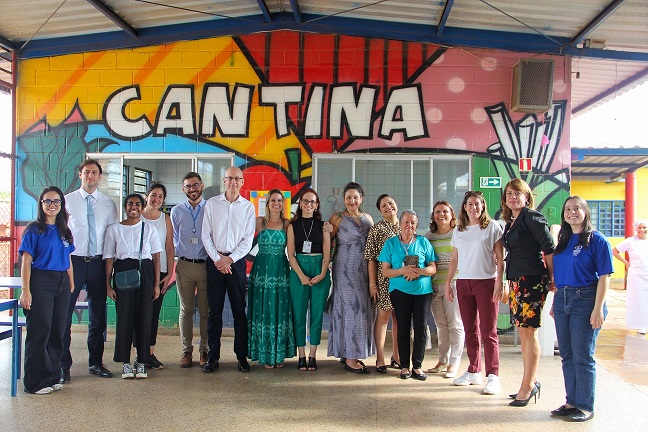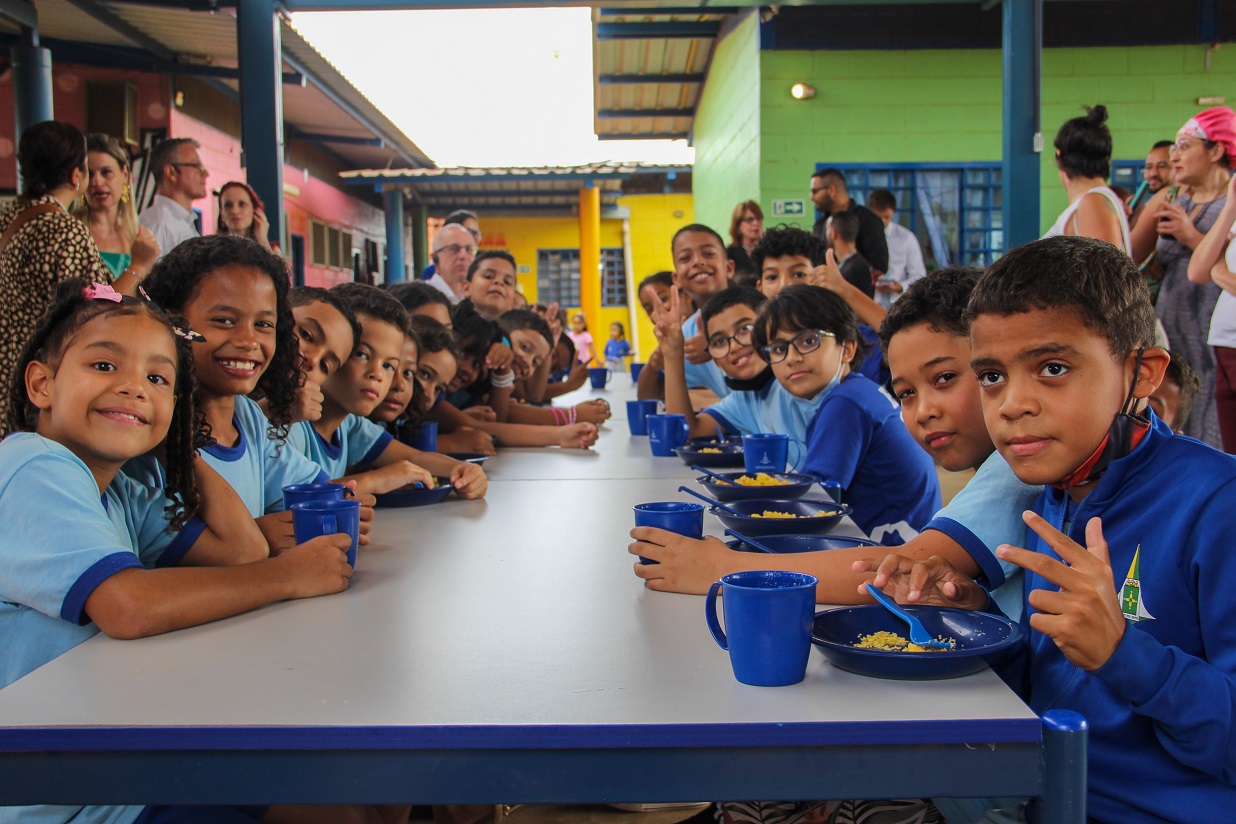
On Tuesday, 12 March, a British delegation, composed of the UK Ambassador to Brazil, Stephanie Al-Qaq, the Second Permanent Under-Secretary at the Foreign, Commonwealth & Development Office (FCDO), Nick Dyer, and embassy staff visited the School Class 66, which is located in the Sol Nascente community, in the Federal District, to find out how the National School Feeding Programme (PNAE, in Portuguese) works in real time, and to understand, above all, the connection with family farming.
During the visit, which was organised with the support of the United Nations World Food Programme (WFP) Centre of Excellence against Hunger in Brazil and the Federal District Government (GDF, in Portuguese), the delegation was able to see how the food is stored, prepared and served and how the school feeding menus are prepared. The British delegation followed the children’s meal and visited the reading room and the vegetable garden, where food and nutrition education activities are carried out.
The ambassador highlighted the vast experience that the Brazilian government and the Centre of Excellence have in providing other countries with good practices in school feeding and the impact this has on achieving Sustainable Development Goal 2 – Zero Hunger and Sustainable Agriculture. “This kind of visit is important to understand more about the work of the Brazilian government and the WFP Centre of Excellence, especially about the impact of this kind of programme on children’s lives here in Brazil. For us, it’s essential to understand more about this type of programme in order to take best practices to other parts of the world,” said Stephanie.
School Class 66 has been in operation since 2009 and serves around 1,300 students between the ages of 4 and 11. The students are mostly from the Sol Nascente community and receive two meals at school to supplement the food they eat at home. Students from the Youth and Adult Education (EJA, in Portuguese) programme, some of whom are parents of students from regular shifts, also dine at the school.
The food is prepared by a team of eight hired cooks and the menu is designed by nutrition professionals. The meals use products from local agriculture, such as fruit, vegetables and beans. Purchases from small producers, carried out in accordance with the recommendations of the PNAE and complemented by purchases made by the GDF, include organic products and involve public calls to producer associations and cooperatives.
Under-Secretary Nick Dyer emphasised that the British government’s intention is to work with Brazil from the perspective of South-South and Trilateral Cooperation and less on development activities within Brazilian territory. “There are a number of great success stories in Brazil and the question is ‘how can we learn the lessons from Brazil and replicate them elsewhere?’ and that’s what I hope trilateral cooperation can do,” said Dyer.
Under-Secretary Nick Dyer was Director-General for Humanitarian Affairs and Development at the FCDO between 2022 and 2023, the first Special Envoy for Combating Hunger and Humanitarian Affairs (2020), Acting Permanent Secretary of the UK Department for International Development (DFID, also in 2020). Dyer is on an official visit to Brazil to learn more about the social development and climate change agendas, including the fight against hunger and trilateral cooperation, as part of the preparatory meetings for the G20.

Centre of Excellence and the partnership with the UK
The WFP Centre of Excellence against Hunger has a history of solid partnership with the United Kingdom. Between 2012 and 2017, the WFP Centre of Excellence and DFID, the former British cooperation agency, carried out South-South cooperation projects with partner countries on the African continent in the areas of food and nutrition security, social protection and technical assistance to family farmers. In 2018, DFID organised a mission to Brazil and had contact with local producers integrated into the PNAE. The following year, the partnership between the Centre and the UK resulted in an international seminar in Mozambique on sustainable and inclusive agricultural systems.
For the Director of the Centre of Excellence, Daniel Balaban, the renewal of dialogue opens up new possibilities for collaboration with the United Kingdom, for example by sharing Brazil’s successful experiences in food and nutrition security and the fight against hunger with other developing countries.
“Brazil’s experience with school meals is an example to the world. Every day, the PNAE feeds around 40 million public basic education students in approximately 150,000 schools across the country. And it does so by buying products from local family farms. Being able to cooperate with other countries and showcase the Brazilian experience further enriches school feeding policies and strengthens mechanisms to tackle hunger in Brazil and around the world,” says Balaban.




